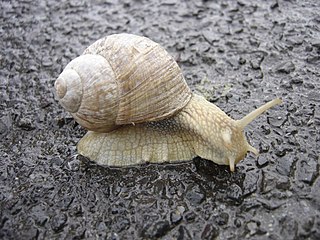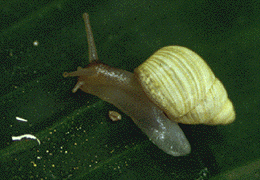Related Research Articles

A snail is, in loose terms, a shelled gastropod. The name is most often applied to land snails, terrestrial pulmonate gastropod molluscs. However, the common name snail is also used for most of the members of the molluscan class Gastropoda that have a coiled shell that is large enough for the animal to retract completely into. When the word "snail" is used in this most general sense, it includes not just land snails but also numerous species of sea snails and freshwater snails. Gastropods that naturally lack a shell, or have only an internal shell, are mostly called slugs, and land snails that have only a very small shell are often called semi-slugs.

Trematoda is a class within the phylum Platyhelminthes. It includes two groups of parasitic flatworms, known as flukes.

Powelliphanta is a genus of large, air-breathing land snails, pulmonate gastropods in the family Rhytididae, found only in New Zealand. They are carnivorous, eating invertebrates, mostly native earthworms. Often restricted to very small areas of moist forest, they are prey to introduced mammalian predators, and many species are threatened or endangered.

The family Sciomyzidae belongs to the typical flies (Brachycera) of the order Diptera. They are commonly called marsh flies, and in some cases snail-killing flies due to the food of their larvae.

Ampullariidae, common name the apple snails, is a family of large freshwater snails, aquatic gastropod mollusks with a gill and an operculum. This family is in the superfamily Ampullarioidea and is the type family of that superfamily.

In zoological nomenclature, a type species is the species name with which the name of a genus or subgenus is considered to be permanently taxonomically associated, i.e., the species that contains the biological type specimen(s). A similar concept is used for suprageneric groups and called a type genus.

Oʻahu tree snails, genus Achatinella, form a large genus of colorful, tropical, tree-living, air-breathing, land snails, arboreal pulmonate gastropod mollusks in the family Achatinellidae.

Sea snail is a common name for slow moving marine gastropod molluscs usually with visible external shells, such as whelk or abalone. They share the taxonomic class Gastropoda with slugs, which are distinguished from snails primarily by the absence of a visible shell.

Cone snails, cone shells, or cones are a large group of small- to large-sized extremely venomous predatory sea snails, marine gastropod molluscs.

Helicidae is a large, diverse family of small to large, air-breathing land snails, sometimes called the "typical snails."

Physidae, common name the bladder snails, is a monophyletic taxonomic family of small air-breathing freshwater snails, aquatic pulmonate gastropod molluscs in the clade Hygrophila.

Zonitidae, common name the true glass snails, are a family of mostly rather small, air-breathing land snails, terrestrial pulmonate gastropod mollusks in the superfamily Zonitoidea.
Paravitrea clappi is a species of land snail in the family Zonitidae, the true glass snails. It is known as the Mirey Ridge supercoil. This species is endemic to the United States, where it is known from the Great Smoky Mountains National Park in the Appalachian Mountains.

A land snail is any of the numerous species of snail that live on land, as opposed to the sea snails and freshwater snails. Land snail is the common name for terrestrial gastropod mollusks that have shells. However, it is not always easy to say which species are terrestrial, because some are more or less amphibious between land and fresh water, and others are relatively amphibious between land and salt water.

Achatinellidae is a family of tropical air-breathing land snails, terrestrial pulmonate gastropod mollusks in the superfamily Pupilloidea.

Camaenidae is a family of air-breathing land snails, terrestrial pulmonate gastropod mollusks in the superfamily Helicoidea, the typical snails and their allies. This is one of the most diverse families in the clade Stylommatophora.

Partula is a genus of air-breathing tropical land snails, terrestrial pulmonate gastropod mollusks in the family Partulidae. Many species of Partula are known under the general common names "Polynesian tree snail" and "Moorean viviparous tree snail". Partulids are distributed across 5,000 sq mi (13,000 km2) of Pacific Ocean islands, from the Society Islands to New Guinea.
The clausilium is a calcareous anatomical structure which is found in one group of air-breathing land snails: terrestrial pulmonate gastropod mollusks in the family Clausiliidae, the door snails. The clausilium is one part of the clausilial apparatus.

Freshwater snails are gastropod mollusks which live in fresh water. There are many different families. They are found throughout the world in various habitats, ranging from ephemeral pools to the largest lakes, and from small seeps and springs to major rivers. The great majority of freshwater gastropods have a shell, with very few exceptions. Some groups of snails that live in freshwater respire using gills, whereas other groups need to reach the surface to breathe air. In addition, some are amphibious and have both gills and a lung. Most feed on algae, but many are detritivores and some are filter feeders.

Malayemys is a genus of turtles in the family Geoemydidae. It was considered monotypic until 2004. It is found in several countries of Southeast Asia.